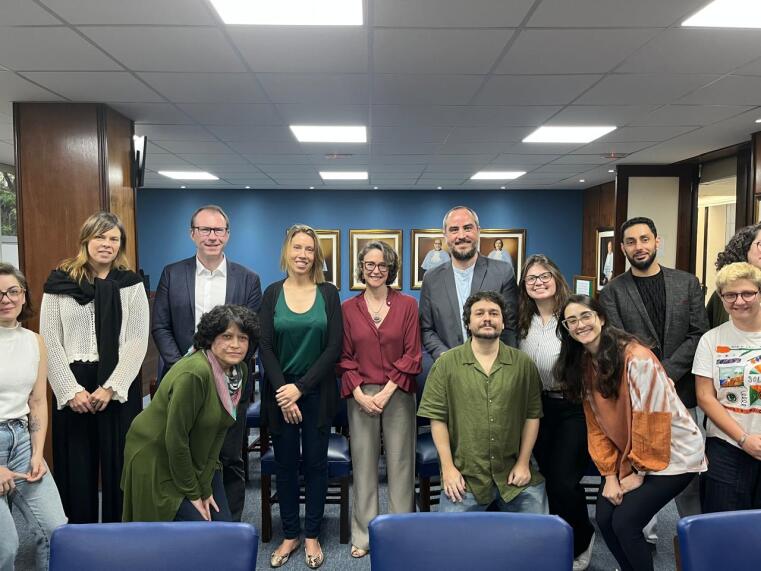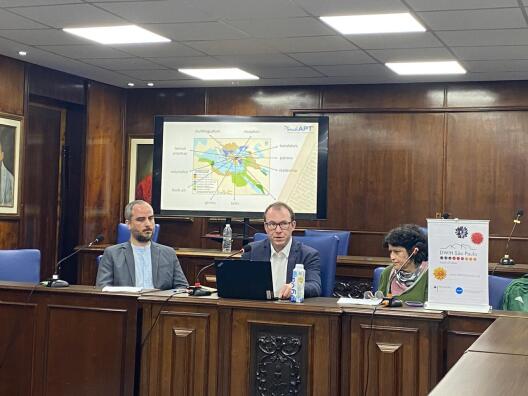Professor at the University of Münster co-organises an event on the history of the Middle East in São Paulo and Rio de Janeiro

In September, Cíntia Toth, Director of the Brazil Centre’s Liaison Office in São Paulo, welcomed Prof. Dr. Philip Bockholt from the Institute of Arabic and Islamic Studies at the University of Münster in Brazil. In collaboration with the University of São Paulo (USP) and the Fluminense Federal University (UFF) – both leading institutions in Arab–Islamic studies in Brazil – and with funding from the German Centre for Research and Innovation São Paulo (DWIH - São Paulo), Prof. Bockholt organised a workshop series entitled ‘‘New Approaches to the History of the Middle East in Germany and Brazil“. The aim of the workshop serieswas to identify synergies and complementarities in the research conducted by the participating German and Brazilian institutions, ass well as to discuss options for short- and medium-term cooperation. The events brought together approximately 55 participants across both cities.
From 16 to 18 September, Master’s and doctoral students and other researchers from the postgraduate programme in economic history at USP’s Faculty of Philosophy, Languages and Human Sciences (FFLCH) met for presentations and discussions with Prof. Bockholt and Prof. Dr. Arlene Clemesha, the director of the postgraduate programme. Together they explored research paths pursued both in Brazil and in Münster: the debate covered a wide range of topics, including linguistic and cultural interactions, philosophy and religiosity, translation studies, film and media, colonialism and national identity, Palestine and the international community, as well as the connections between Brazil and the Arab world.

In addition to discussions on contemporary Arab history, the history of Palestine, and Brazil–Arab relations, Prof. Bockholt provided a historical perspective drawn from his research on the Turko-Persian world through historical manuscripts. In his presentation, he highlighted changes in translations of literary works between the 14th and 18th centuries, involving the three scholarly languages of the Ottoman Empire: Arabic, Persian and Turkish.
The following week, on 23 and 24 September, the workshop moved to Niterói. This edition was organised in collaboration with Prof. Dr. Paulo da Rocha Pinto, an associate professor in the postgraduate programme in Anthropology and head of the ‘‘Núcleo de Estudos do Oriente Médio“ (NEOM) at Fluminense Federal University (UFF). Prof. Dr. Hülya Çelik of the Ruhr-University Bochum, whose research focuses on Ottoman–Turkish literature and manuscript culture, also contributed to this edition.
Highlights included Prof. Pinto’s presentation on NEOM’s work and his current ethnographic fieldwork with members of Aleppo’s Sufi communities, now dispersed across France, Germany, Lebanon, and Jordan due to the regional conflict. At both USP and UFF, colleagues from the German Academic Exchange Service (DAAD) and the German Research Foundation (DFG) contributed to the workshop with presentations on research and funding opportunities in Germany.
To wrap up the activities in Brazil, the final day featured a visit to the National Library in Rio de Janeiro, where the professors had the opportunity to view and handle ancient manuscripts from the library’s collection. Among the identified options for continuing the collaboration were workshops on manuscript research and the submission of joint research proposals that include mobility for doctoral and postdoctoral researchers from Brazil and Germany.
Photos






